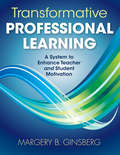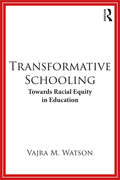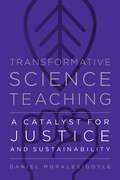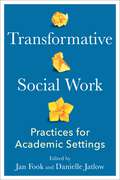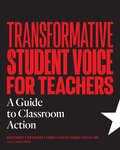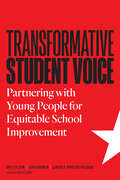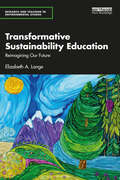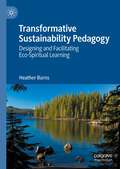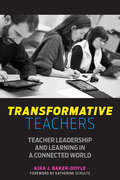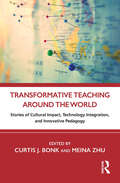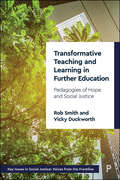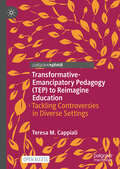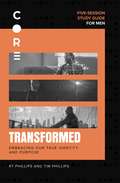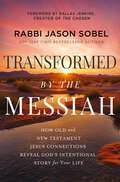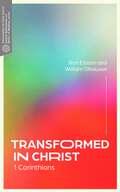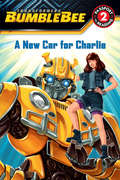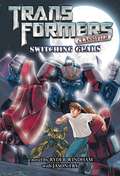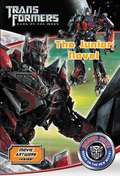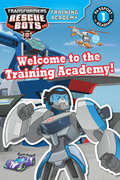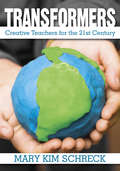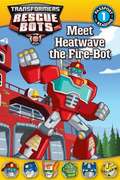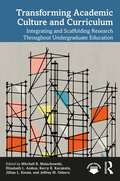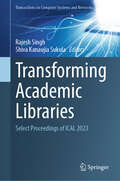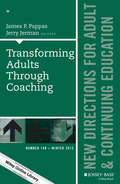- Table View
- List View
Transformative Professional Learning: A System to Enhance Teacher and Student Motivation
by Dr Margery B. GinsbergMotivation is foundational to learning This book’s bold new vision for professional learning emphasizes the importance of intrinsic motivation and respect for cultural diversity. Knowing that culture and motivation are inseparable influences on learning, Margery B. Ginsberg provides practical steps for teaching and learning that are grounded in the reality of students' lives. The program’s processes include: Shadowing students to help sharpen teachers’ understanding of student motivation. Conducting home visits to better connect with students’ lives and families Collaborating with other teachers to design lessons Analyzing data in collaboration with students, families, and community members
Transformative Schooling: Towards Racial Equity in Education
by Vajra M. WatsonDiscussions of achievement gaps are commonplace in education reform, but they are rarely interrogated as a symptom of white supremacy. As an act of disruption, award-winning scholar Vajra Watson pierces through the rhetoric and provides a provocative analysis of the ways schools can become more racially inclusive. Her research is grounded in Oakland where longitudinal data demonstrated that Black families were sending their children to school, but the ideals of an oasis of learning were being met with the realities of racism, low expectations, and marginalization. As a response to this intergenerational crisis of miseducation, in 2010, the school district joined forces with community organizers, religious leaders, neighborhood elders, teachers, parents, and students to address institutionalized racism. Seven years later, Watson shares findings from her investigation into the school district’s journey towards justice. What she creates is a wholly original work, filled with penetrating portraits that illuminate the intense and intimate complexities of working towards racial equity in education. As a formidable case study, this research scrutinizes how to reconfigure organizational ecosystems as spaces that humanize, heal, and harmonize. Emerging from her scholarship is a bold, timely, and hopeful vision that paves the way for transformative schooling.
Transformative Science Teaching: A Catalyst for Justice and Sustainability
by Daniel Morales-DoyleA call to action championing equity and social justice in K–12 science curriculum
Transformative Social Work: Practices for Academic Settings
by Fook, Jan; Jatlow, DanielleTransformative approaches to social work have been popular for some time. Most discussions of this perspective, however, focus on actual practice with clients or service users, not educational contexts. In addition, there is often a lack of clarity about what “transformative” really means, both in theory and in practice.This book brings together a range of contributors to reconsider transformative social work, focusing on concrete examples in academic settings both inside and outside the classroom. They illustrate theories and practices of transformative social work in the academy in detail from different standpoints. Chapters by scholars at all career stages, students, staff, and managers consider all aspects of academic work—teaching and learning, research, and administration—as well as labor that academics perform outside the university. Authors describe their understanding of a transformative perspective as well as the practices that flow from this conception, providing rich detail on how a transformative approach can be implemented.This book stands out for the breadth of its focus, its international contributions, and its openness about the new challenges involved in doing transformative work today. It develops an expansive and systematic understanding of what “transformative” can mean across the entire academic and professional context of social work education.
Transformative Student Voice for Teachers: A Guide to Classroom Action
by Ben Kirshner Shelley Zion Carlos P Hipolito-Delgado Dane StickneyA step-by-step guidebook for teachers on how to build a classroom community that empowers students through critical reflection, inquiry, and action to drive school transformation
Transformative Student Voice: Partnering with Young People for Equitable School Improvement
by Ben Kirshner Shelley Zion Carlos P Hipolito-DelgadoA testament to the power of centering youth voices in planning and implementing school reform
Transformative Sustainability Education: Reimagining Our Future (Research and Teaching in Environmental Studies)
by Elizabeth A. LangeThis book lays out the principles and practices of transformative sustainability education using a relational way of thinking and being. Elizabeth A. Lange advocates for a new approach to environmental and sustainability education, that of rethinking the Western way of knowing and being and engendering a frank discussion about the societal elements that are generating climate, environmental, economic, and social issues. Highlighting the importance of Indigenous and life-giving cultures, the book covers educational theory, transformation stories of adult learners, social and economic critique, and visions of changemakers. Each chapter also has a strong pedagogical element, with entry points for learners and embodied practices and examples of taking action at micro/meso/macro levels woven throughout. Overall, this book enacts a relational approach to transformative sustainability education that draws from post humanist theory, process thought, relational ontology, decolonization theory, Indigenous philosophy, and a spirituality that builds a sense of sacred towards the living world. Written in an imaginative, storytelling manner, this book will be a great resource for formal and nonformal environmental and sustainability educators.
Transformative Sustainability Pedagogy: Designing and Facilitating Eco-Spiritual Learning
by Heather BurnsThis book offers stories and tools for designing and facilitating transformative sustainability pedagogy and explores how educators can intentionally design and facilitate eco-spiritual learning that promotes healing and wholeness. In these times of accelerating climate change and systemic injustice, we need learning spaces that both challenge our unsustainable dominant paradigms and support us in re-learning how to live in relational and regenerative ways. Rooted in the paradigm of interconnection and relationality, this book offers practical ways to design and facilitate learning toward more just, ecological, and spiritual ways of being. The author weaves together a variety of personal stories of teaching and learning, an exploration of how new science can be applied to transformative sustainability pedagogy, and eco-spiritual practices to help educators nurture wholeness and connection in themselves and in learning spaces.
Transformative Teachers: Teacher Leadership and Learning in a Connected World
by Kira J. Baker-DoyleTransformative Teachers offers an insightful look at the growing movement of civic-minded educators who are using twenty-first-century participatory practices and connected technologies to organize change from the ground up. Kira J. Baker-Doyle highlights the collaborative, grassroots tactics that activist teachers are implementing to transform their profession and pursue greater social justice and equity in education. The author provides a framework and practical suggestions for charting the path to transformative teacher leadership as well as suggestions for how others, including administrators and outside organizations, can support them. In addition, the book profiles fifteen transformative teachers who are changing the face of education, features three case studies of organizational allies (Edcamps, the Philadelphia Education Fund, and the Connected Learning Alliance), and includes insights from a wide range of educational leaders. A guide to the norms and practices of innovative educators, Transformative Teachers offers a clear and compelling vision of the potential for grassroots change in education.
Transformative Teaching Around the World: Stories of Cultural Impact, Technology Integration, and Innovative Pedagogy
by Curtis J. Bonk Meina ZhuTransformative Teaching Around the World compiles inspiring stories from Fulbright-awarded teachers whose instructional practices have impacted schools and communities globally. Whether thriving or struggling in their classrooms, instructing in person or online, or pushing for changes at high or low costs and risk levels, teachers devote intense energy and careful decision-making to their students and fellow staff. This book showcases an expansive variety of educational practices fostered across international contexts by real teachers: active and empowering learning strategies, critical thinking and creative problem-solving, cultural responsiveness and sustainability, humanistic integration of technology, and more. Pre- and in-service teachers, teacher educators, online/blended instructors, and other stakeholders will find a wealth of grounded, motivating approaches for transforming the lives of learners and their communities.
Transformative Teaching and Learning in Further Education: Pedagogies of Hope and Social Justice (Key Issues in Social Justice)
by Vicky Duckworth Rob SmithBased on the Transforming Lives research project, this book explores the transformative power of further education. The book outlines a timely and critical approach to educational research and practice, and draws extensively on the testimonies of students and teachers to construct a model of transformative teaching and learning. It critiques reductive ‘skills’ policies in further education and illuminates the impact colleges and lifelong learning have on social justice outcomes for individuals, their families and communities. For trainee teachers, teachers, leaders, researchers and policy makers alike, the book presents a persuasive argument for transformative approaches to teaching and learning, and highlights the often unmeasured and under-appreciated holistic social benefits of further education.
Transformative-Emancipatory Pedagogy (TEP) to Reimagine Education: Tackling Controversies in Diverse Settings
by Teresa M. CappialiThis book advocates for a paradigm shift in education through Transformative-Emancipatory Pedagogy (TEP)—a dynamic framework grounded in humanistic, humanizing, and decolonial philosophies. TEP promotes holistic, inclusive, and experiential learning, with a focus on personal and societal transformation. Initially developed to address controversial and sensitive topics in diverse social science classrooms, TEP reimagines education for an increasingly diverse and interconnected world. By harnessing learners' diverse knowledge and perspectives, TEP fosters critical thinking and active citizenship. More than a framework for inclusion, TEP enriches education by empowering learners to engage with complex social issues, preparing them to navigate and shape the world with empathy, agency, and a commitment to social justice. This is an open access book.
Transformed Bible Study Guide: Embracing Our True Identity and Purpose (CORE for Men)
by Tim Phillips RT PhillipsGod has redeemed you. Now he's transforming you. Unlike redemption, we have to participate in our own spiritual transformation...but God doesn't ask us to do it alone. The two CORE for Men studies—Redeemed and Transformed—each feature five raw and real video stories (DVD/video streaming sold separately) of men who have fought with feelings of isolation and disqualification. Through these personal stories of brokenness and transformation, you and your group will be encouraged to step out of stagnancy and into your own God-shaped stories.Sessions and Contributors include: Identity (Propaganda, poet and activist)Transformation (Willie Alfonso, chaplain for the New York Yankees)Brotherhood (Sam & Emmanuel Acho, NFL players)Choices (Jerry Quiroz, professional soccer player)Reload (Clint Bruce, US Navy SEAL)Brought to you by the men behind the organization Promise Keepers, the passion behind the CORE for Men studies is to create spaces where men have permission to be real—where men discover they are not alone with the kind of doubts and fears they face everyday.CORE is a biblical expression of solidarity that will lead you back to a God who's in the business of turning brokenness into forgiveness and pain into a new and fulfilling purpose.Designed for use with the Transformed: Embracing Our True Identity and Purpose Video Study available on DVD or streaming video, sold separately.
Transformed by the Messiah: How Old and New Testament Jesus Connections Reveal God's Intentional Story for Your Life
by Rabbi Jason SobelDiscover the Jesus who has been pursuing you since before time! Join an unforgettable journey through the birth, ministry, and death of the Messiah as found in the Old and New Testaments, and have your own life transforming experience.When reading the Bible we often miss essential details that add richness and significance, and therefore don't grasp the bigger picture. New York Times bestselling author Rabbi Jason Sobel, in his unique and engaging way, helps readers see God's story in high definition, enabling them to better understand the cultural and historical background of Scripture, God's intention for every detail, and how it applies to our lives.Revealing hidden gems of prophecy and promises, Transformed by the Messiah helps answer questions such as:Is there any significance to the fact that Jesus was born in Bethlehem?How does the Messiah's baptism set an example for us to emulate and what did it undo?Did the Messiah have to die on a cross and why did he not rise until the third day?Who are the shepherds and why was it important that the baby be found wrapped in swaddling cloth and laid in a manger?How can we embrace a supernatural perspective—living with a sense of possibility--and not be limited by a strictly natural perspective?Why does Genesis 3 talk about the "seed of a woman?"Why were the disciples so willing to immediately drop their nets, leave their families, and follow Jesus?You'll also learn how to respond with faith, not fear; trust God's plan, purpose, and provision; and move forward in the power of the Spirit.If you need hope, or simply a better understanding of God's plan of redemption for all mankind and your part in it, Transformed by the Messiah will open your heart and mind to be able to live in the supernatural power of God's Spirit as you follow Jesus and His command to make disciples. And whether you are Jewish or not, to help you read and study in a way that connects His story in the Old and New Testaments.
Transformed in Christ: 1 Corinthians (Transformative Word)
by William Olhausen Ron ElsdonIs your faith countercultural?When he wrote his first epistle to the church in Corinth, Paul wanted to address two cultural issues that the Christians in the city were wrestling with: prosperity and entertainment. He urged the young believers struggling in the midst of Graeco--Roman society to live lives shaped by Christ. Believers today are not immune to these same worldly temptations the Corinthian church was facing.In Transformed in Christ: 1 Corinthians, Ron Elsdon and William Olhausen show us how Paul uses the cross to define the distinctive patterns of life and behavior which Christians are called. The transformation that comes from cross--shaped wisdom is not a singular moment in a believer's life, but a continual process of refinement. The result is a living, countercultural faith marked by discernment, wisdom, and love.
Transformers Bumblebee: A New Car for Charlie (Transformers)
by HasbroBumblebee is back in this all new action-packed leveled reader! On the run in the year 1987, Bumblebee finds refuge in a junkyard in a small California beach town. Charlie, on the cusp of turning 18 and trying to find her place in the world, discovers Bumblebee, battle-scarred and broken.Passport to Reading Level 2© 2018 Hasbro. All Rights Reserved.
Transformers Classified: Switching Gears
by Ryder Windham Jason FryAn original Transformers novel series! Secrets are uncovered in the Nevada desert when a boy witnesses two Transformers arrive on Earth.
Transformers Dark of the Moon: The Junior Novel
by Michael KellyIn this fast-paced and engaging junior novelization of Transformers: Dark of The Moon, a long-lost spaceship from Cybertron is discovered on the moon. What secrets does it hold? The race to find out begins when the Decepticons come out of hiding to take over and the Autobots fight back to save their new home.
Transformers Rescue Bots: Welcome to the Training Academy!
by Justus LeeThe Transformers Rescue Bots are ready to help the people of Griffin Rock in this brand new level-1 reader!The Rescue Bots have a great new home base until the computer goes haywire. Can the team work together to fix it, or will their new Training Academy be discovered?Passport to Reading Level 1©2017 Hasbro. All Rights Reserved.
Transformers: Creative Teachers for the 21st Century
by Mary K. SchreckPacked with research-based strategies, this step-by-step resource shows educators how to cultivate a more creative teaching practice by accessing their creative resources, eliciting students' creativity, and more.
Transformers: Meet Chase the Police-Bot
by Lisa SheaOptimus Prime has selected a special team of Transformers to work side-by-side with the people of Earth--they are called the Rescue Bots! Chase the Police-Bot changes into a police car and is partnered with Chief Charlie Burns. Together they're unstoppable!A Passport to Reading Level 1 book.
Transformers: Meet Heatwave the Fire-Bot
by Lisa SheaOptimus Prime has selected a special team of Transformers to work side-by-side with the people of Earth--they are called the Rescue Bots! Heatwave the Fire-Bot changes into a fire engine and is partnered with Kade Burns. In this story, the Rescue Bots have to stop some runaway floating lobsters from ruining the town parade!A Passport to Reading Level 1 book.
Transforming Academic Culture and Curriculum: Integrating and Scaffolding Research Throughout Undergraduate Education
by Mitchell R. MalachowskiInstitutions across the higher education landscape vary, and each navigates change in its own way. This volume describes how institutions and departments influence the success of structural and cultural transformations to advance curricular reform.A product of the Council on Undergraduate Research Transformations project, a six-year, longitudinal research study funded by the United States National Science Foundation, this text features the goals, strategies, and outcomes that evolved from the experiences at 12 diverse colleges and universities in creating innovative undergraduate curricula and campus cultures that maximize student success. With the goal of achieving departmental transformations in both student learning and academic culture – by backward-designing and scaffolding research into and across undergraduate curricula – editors include scholarly findings, step-by-step guides, and a toolkit section, with plentiful online resources, to help readers develop and execute personalized change processes on their own campuses.Designed to span both theory and practice for departments and institutions to transform undergraduate education to increase student success, this book is vital for all higher education scholars, practitioners, faculty, staff, and leaders interested in creating research-rich curricula and change more broadly.Visit the Council on Undergraduate Research website here: https://www.cur.org/.
Transforming Academic Libraries: Select Proceedings of ICAL 2023 (Transactions on Computer Systems and Networks)
by Rajesh Singh Shiva Kanaujia SukulaThe book comprises the proceedings of the International Conference on Academic Libraries (ICAL 2023) in the context of developing a vision for the next generation of libraries which will contribute to nation-building and give a competitive edge to the country in becoming a knowledge economy. The book provides a quality reading and exchange of ideas to all stakeholders to deliberate, dwell, and brainstorm upon the diverse and enormous role that academic libraries may play in enhancing the higher education landscape in developed and developing countries with particular reference to India by 2030. The book includes literature and opportunities to identify the strengths and gaps in the academic library system and to suggest new management models, mechanisms, policies, and national and international programs for reshaping academic libraries into next-generation libraries for higher education.
Transforming Adults Through Coaching: New Directions For Adult And Continuing Education (J-B ACE Single Issue Adult & Continuing Education)
by James P. Pappas Jerry JermanThe field of coaching adult populations has grown dramatically over the past two decades. This volume brings together coaching scholars and experts to review this trend, examine some of the theoretical foundations of the field, and explore how coaching adults manifests itself in the workplace, at executive levels, and in educational and nonprofit organizations. Readers will: Gain understanding of this field of coaching adult audiences, Learn how adult development and adult learning theories undergird this work, and See applications of coaching approaches through numerous case studies. This is the 148th volume of the Jossey Bass series New Directions for Adult and Continuing Education. Noted for its depth of coverage, it explores issues of common interest to instructors, administrators, counselors, and policymakers in a broad range of education settings, such as colleges and universities, extension programs, businesses, libraries, and museums. This is the 148th volume of the Jossey Bass series New Directions for Adult and Continuing Education. Noted for its depth of coverage, it explores issues of common interest to instructors, administrators, counselors, and policymakers in a broad range of education settings, such as colleges and universities, extension programs, businesses, libraries, and museums.
